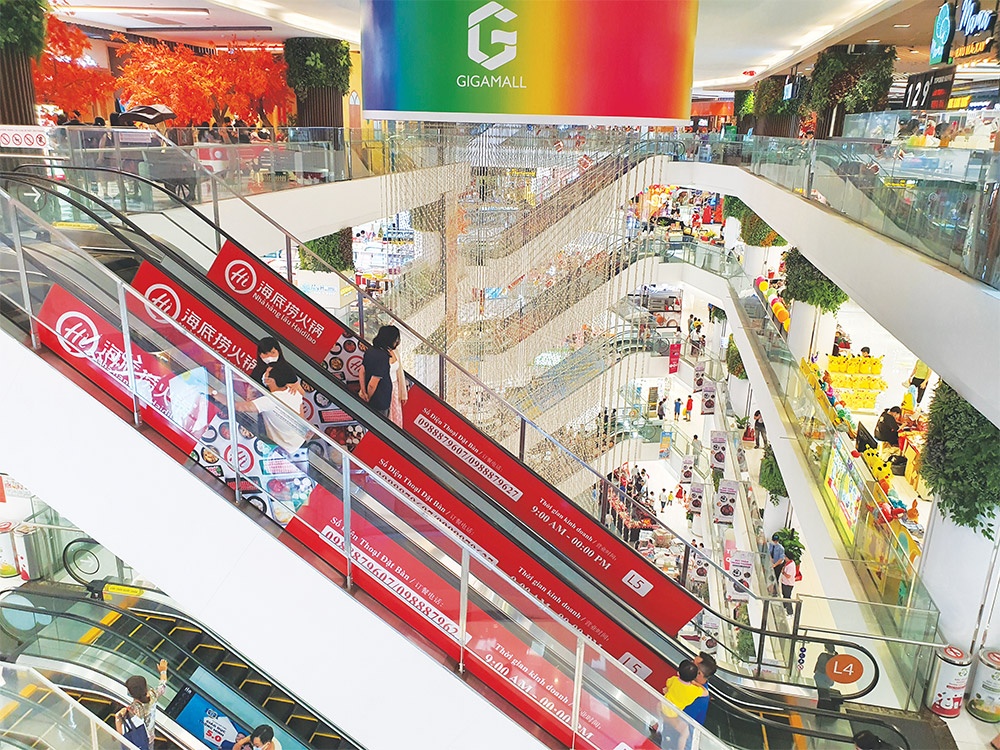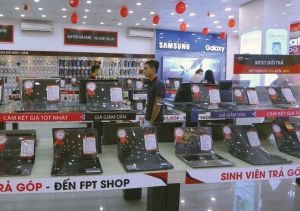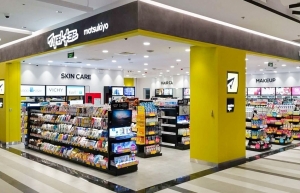Traditional retailers buckle under strain
 |
| Previously bustling commercial centres are having to embrace online models to maintain interest, photo Le Toan |
Nguyen Manh, owner of a clothing store on Nguyen Trai street of Ho Chi Minh City, told VIR that his shop’s revenues have halved over this festive season compared to the previous year.
“This sharp decrease in revenue has been due to the economic downturn and customers now preferring to buy products online, instead of coming to shops directly,” Manh said.
Manh said he would hand back his space to the landlord at the end of the lunar year because he cannot afford the lease expenses.
Many buildings that used to be places for renting commercial space in District 1, such as around Ben Thanh market area, Le Loi, Nguyen Hue, Dong Khoi, and Hai Ba Trung have seen many “for lease” signs for some time but still remain vacant.
Many townhouses that previously had rental prices ranging $4,100-12,000 per month are also looking for new tenants. In Hanoi, a range of vacant space are offered in central areas and even the iconic streets of Ba Dinh and Hoan Kiem districts.
According to data from batdongsan.com.vn, the townhouse market at the end of last year in both cities decreased quite significantly. Dinh Minh Tuan, director of batdongsan.com.vn for the southern region, analysed that the change in the business model of tenants was one of the reasons for high vacancy numbers.
“E-commerce is fast-growing and brands now use online stores for both branding and selling goods. The market is difficult and brands are forced to depend on online electronic platforms to sell products,” Tuan said.
Another reason is the decline in the number of visitors to central markets, with more brands expanding towards the provincial and outskirts markets. “Now they are narrowing in the main markets, converting their model to e-commerce, and expanding in suburban areas,” Tuan added.
According to experts, the rental situation of townhouses in Hanoi and Ho Chi Minh City is in a stagnant state because landlords are still trying to keep prices high and are willing to leave premises vacant rather than negotiate. Meanwhile, tenants are restructuring ways of selling to be more favourable for buyers.
Changing to survive
Ben Thanh Market has long been a bustling commercial centre serving tourists. However, the traditional market model has encountered many difficulties in the current shopping trend when customers are attracted by flashy shopping malls and addicted to online channels. As a result, traditional markets like Ben Thanh have suffered from vacancies, with revenues dropping dramatically in recent years.
This market, however, was one of the first traditional markets in the country to use livestream sales with the help of TikTok and other social media accounts to boost sales. The online shopping and entertainment festival held in Ben Thanh market in December ended with nearly 19,000 orders sold, attracting more than 150 million followers at livestream sessions. During a live session in mid-December, Nguyen Thuy Bao Tran, the owner of Ngoc Chau candy shop, said that in just the first few minutes of carrying out a livestream with online influencers, nearly 100 orders were made.
According to Truong Minh Huy Vu, deputy director of the Ho Chi Minh City Institute for Development Research, e-commerce livestreams have been demonstrating their potential and effectiveness. “The results have been proven at Ben Thanh Market recently when traders can sell their products without depending on tourists or offline visitors,” Vu said.
While the situation of rental premises on streets is grey, commercial and retail centres are more vibrant, especially during the holidays, thanks to comprehensive services and diverse entertainment services. At Saigon Centre, Lotte Mart, and Thiso Mall located in the centre of Ho Chi Minh City, the number of visitors is always high.
According to CBRE Vietnam, in 2023, solid rental growth of retail real estate market was seen both in Hanoi and Ho Chi Minh City with less vacant spaces. The average occupancy rate was 88 per cent in Hanoi and around 91 per cent in Ho Chi Minh City. The asking rent at prime locations continued to rise thanks to the active entrance and expansion of luxury brands. In Hanoi, the asking rent for the ground floor in the central business district area was $162 per square metre per month, up by 13 per cent on-year.
Bustling commercial centres
According to Thanh Pham, associate director of Research and Consulting at CBRE Vietnam, while shophouses face challenges, shopping malls continue to perform relatively well, maintaining high occupancy. “Most international brands, especially in the high-end segment, have experienced more positive sales activities in the Asia-Pacific region than in other areas, driving the active pursuit of new store openings and expansions,” Thanh said.
However, she added that prime retail space with high quality remains limited in Vietnam, even in the two biggest cities.
“In 2023, Vietnam’s retail sales saw a growth of 9.6 per cent, lower than the 19.8 per cent growth observed in 2022. Nevertheless, Vietnam’s retail sector demonstrated a more positive trajectory than other regional markets. This year, we recorded a surge in new market entrants and expansions in categories such as food and beverages, entertainment, and fashion in both Hanoi and Ho Chi Minh City,” Thanh added.
Vietnam’s retail market welcomed many new project openings in 2023, adding nearly 111,000sq.m of retail space in Hanoi and Ho Chi Minh City. Lotte Mall West Lake Hanoi, launched in the second half, was the highlight of the year. With a net leasable area of up to 72,000sq.m (excluding the basement and aquarium area), Lotte Mall West Lake Hanoi is the largest shopping mall to be built in the last four years.
Linc Complex in the Park City township also opened in Hanoi last year, while The Loop and Hung Vuong Plaza made a comeback in Hanoi and Ho Chi Minh City respectively after renovation and changing ownership.
This year is anticipated to be another active one for the retail market, with the introduction of five new projects in Hanoi, providing a total net leasable area of nearly 40,000sq.m. Meanwhile, in Ho Chi Minh City, Vincom Shopping Center in Vinhomes Grand Park (District 9) and Parc Mall (District 8) will come into operation, providing nearly 70,000sq.m of net leasable area in total.
In a retail industry report released in December, Petroleum Securities said that Vietnam’s retail market is forecast to grow by over 12 per cent in the next few years. Revenues are forecast to be worth up to $163.5 billion by 2027, with prominent industries being consumer goods, electronics, technology and jewellery.
Meanwhile, Vietnam Report expects that the retail market is forecast to increase to $350 billion in the next five years.
 | Retailers weigh up the perks of e-voucher models Cooperation between e-voucher issuers and retailers is benefiting both sides and bringing more diverse shopping experiences to customers, but some companies require more proof of the effectiveness of digital vouchers. |
 | Major electronics retailers face tough times Leading retailers have seen a sharp decline in their profits in the year to date amid a tough business environment. |
 | Top prospects shine through for retailers Positive long-term growth prospects have become the driving force for foreign retailers to accelerate expansion plans in Vietnam. |
 | Retailers urged to adopt cutting-edge trends The retail industry in Vietnam is undergoing a major shift, and those who want to stay ahead of the competition need to be aware of the latest trends and innovations. |
What the stars mean:
★ Poor ★ ★ Promising ★★★ Good ★★★★ Very good ★★★★★ Exceptional
Related Contents
Latest News
More News
- State corporations poised to drive 2026 growth (February 03, 2026 | 13:58)
- Why high-tech talent will define Vietnam’s growth (February 02, 2026 | 10:47)
- FMCG resilience amid varying storms (February 02, 2026 | 10:00)
- Customs reforms strengthen business confidence, support trade growth (February 01, 2026 | 08:20)
- Vietnam and US to launch sixth trade negotiation round (January 30, 2026 | 15:19)
- Digital publishing emerges as key growth driver in Vietnam (January 30, 2026 | 10:59)
- EVN signs key contract for Tri An hydropower expansion (January 30, 2026 | 10:57)
- Vietnam to lead trade growth in ASEAN (January 29, 2026 | 15:08)
- Carlsberg Vietnam delivers Lunar New Year support in central region (January 28, 2026 | 17:19)
- TikTok penalised $35,000 in Vietnam for consumer protection violations (January 28, 2026 | 17:15)

 Tag:
Tag:


















 Mobile Version
Mobile Version